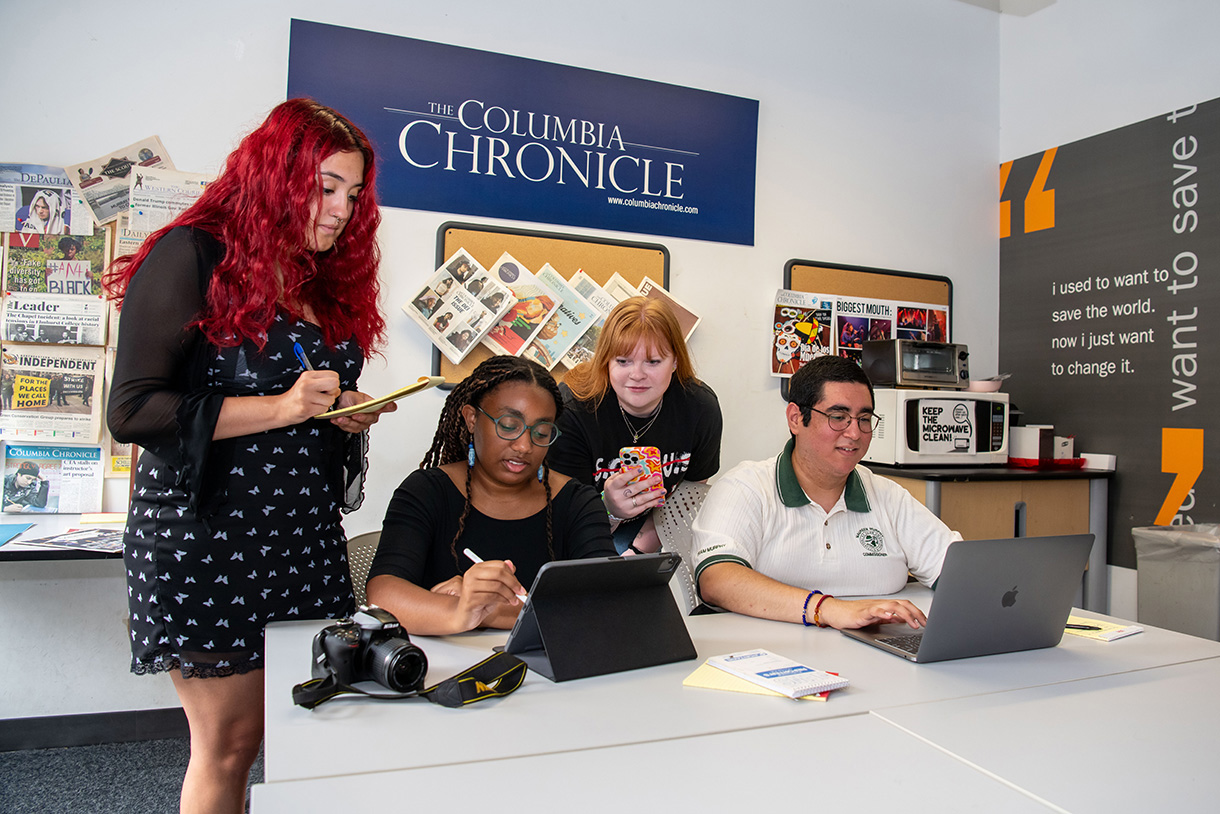'The Columbia Chronicle' Wins Grant to Investigate Mental Health Issues
 Members of "The Columbia Chronicle" staff. From left to right: Kaelah Serrano, Leah Love, Sydney Mantei, and Andres Guerra.
Members of "The Columbia Chronicle" staff. From left to right: Kaelah Serrano, Leah Love, Sydney Mantei, and Andres Guerra. The Solutions Journalism Network’s Student Media Challenge recently awarded The Columbia Chronicle, the official student-run news publication of Columbia College Chicago, a $10,000 grant to investigate student mental health issues through a solutions lens. The Chronicle, along with seven other collegiate centers of journalism, was chosen from an applicant field of 40 and will spend the 2023-24 academic year reporting on mental health on campus, including the rising rates of suicides, depression, and anxiety.
“As an editor and a journalist, I am thrilled to have been selected for this grant and I am eager hit the ground running in the fall,” says Olivia Cohen, a Columbia student who was the Chronicle’s editor-in-chief last spring and will return in that role this fall. “With the Chronicle being selected, it speaks volumes for the journalism at Columbia. The student journalists that come through the program and the Chronicle are absolute powerhouses in their craft and we could not be where we are without our incredible journalism faculty.”
The Student Media Challenge provides training and support from the Solutions Journalism Network, with grants going to college and university newsrooms to incorporate solutions journalism into their media operations.
The Challenge aligns with the Solutions Journalism Network’s mission to encourage the practice of solutions journalism – rigorous, credible reporting on responses to social problems.
"As journalists, our mission is to inform the communities we are writing for, so incorporating a solutions-driven lens into our work is a way to elevate that work,” Cohen says.
With more than 60 percent of college students suffering from at least one mental health problem, according to a national survey released by Health Minds Network, the Challenge offers Columbia students an important reporting opportunity. As part of its plan, the Chronicle will leverage solutions journalism principles and practices to identify examples of educational institutions successfully supporting students who struggle with mental health issues.
“The money from the grant will allow us to pay students to report on this critically important topic,” says Jackie Spinner, the Chronicle’s faculty advisor. “But what I like most about doing this through the solutions journalism lens is that it will allow them to explore things that have worked best, even given the financial constraints that many colleges and universities are facing.”
Stories written through the grant will be shared in both English and Spanish and will be included in a special print edition of the Chronicle.
Cohen, who was instrumental in applying for the grant, believes the grant will have a positive impact on the student journalists at the Chronicle as well as for the Columbia community as a whole.
“There is so much that I hope the Chronicle staff takes away from this experience, but overall, I hope it hammers home the need for thoughtful and thorough journalism at all levels,” she says. “This shows that student-driven journalism publications can still produce high-level work that makes a tangible difference in the Columbia community.”
Recent News
- Alum Patricia Kara’s New Book Offers Behind-The-Scenes Look at the Entertainment World
- Grace Kessler Overbeke to Present The Many Mrs Maisels 20th Century US Jewish Female StandUp Comedians
- ASL Conference Brings High School and College Students Together at Columbia College Chicago
- What to Watch and Where to Wander This Winter: Columbia Edition
- Five Columbia Students Earn Prestigious Fashion Scholarships